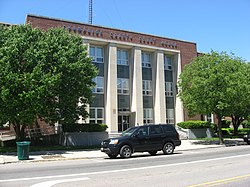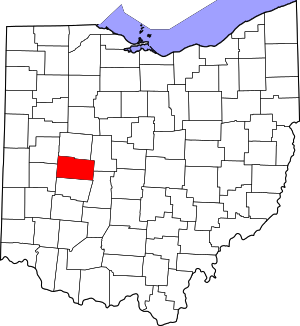|
Champaign County, Ohio
Champaign County is a county located in the U.S. state of Ohio. As of the 2020 census, the population was 38,714.[2] Its county seat and largest city is Urbana.[3] The county takes its name from the French word for "open level country".[4] Champaign County became the 18th of 88 Ohio counties on March 1, 1805. It was formed from parts of Greene and Franklin counties by legislative action.[5] Champaign County comprises the Urbana, OH Micropolitan Statistical Area, which is also included in the Dayton–Springfield–Sidney, OH Combined Statistical Area. GeographyAccording to the U.S. Census Bureau, the county has a total area of 430 square miles (1,100 km2), of which 429 square miles (1,110 km2) is land and 1.2 square miles (3.1 km2) (0.3%) is water.[6] Adjacent counties
Demographics
2000 censusAs of the census[12] of 2000, there were 38,890 people, 14,952 households, and 10,870 families living in the county. The population density was 91 inhabitants per square mile (35/km2). There were 15,890 housing units at an average density of 37 units per square mile (14/km2). The racial makeup of the county was 95.73% White, 2.30% Black or African American, 0.31% Native American, 0.25% Asian, 0.02% Pacific Islander, 0.31% from other races, and 1.08% from two or more races. 0.69% of the population were Hispanic or Latino of any race. There were 14,952 households, out of which 34.00% had children under the age of 18 living with them, 59.70% were married couples living together, 9.20% had a female householder with no husband present, and 27.30% were non-families. 23.50% of all households were made up of individuals, and 9.40% had someone living alone who was 65 years of age or older. The average household size was 2.56 and the average family size was 3.01. In the county, the population was spread out, with 26.20% under the age of 18, 7.90% from 18 to 24, 28.70% from 25 to 44, 24.60% from 45 to 64, and 12.60% who were 65 years of age or older. The median age was 37 years. For every 100 females, there were 95.90 males. For every 100 females age 18 and over, there were 92.90 males. The median income for a household in the county was $43,139, and the median income for a family was $50,430. Males had a median income of $38,265 versus $26,241 for females. The per capita income for the county was $19,542. About 5.10% of families and 7.60% of the population were below the poverty line, including 9.90% of those under age 18 and 7.60% of those age 65 or over. 2010 censusAs of the 2010 United States Census, there were 40,097 people, 15,329 households, and 10,925 families living in the county.[13] The population density was 93.5 inhabitants per square mile (36.1/km2). There were 16,755 housing units at an average density of 39.1 units per square mile (15.1 units/km2).[14] The racial makeup of the county was 94.7% white, 2.2% black or African American, 0.4% Asian, 0.4% American Indian, 0.4% from other races, and 1.9% from two or more races. Those of Hispanic or Latino origin made up 1.1% of the population.[13] In terms of ancestry, 27.6% were German, 14.9% were Irish, 14.3% were American, and 11.8% were English.[15] Of the 15,329 households, 33.7% had children under the age of 18 living with them, 55.9% were married couples living together, 10.2% had a female householder with no husband present, 28.7% were non-families, and 23.9% of all households were made up of individuals. The average household size was 2.56 and the average family size was 3.02. The median age was 39.7 years.[13] The median income for a household in the county was $49,246 and the median income for a family was $58,433. Males had a median income of $44,920 versus $32,847 for females. The per capita income for the county was $23,438. About 10.0% of families and 12.9% of the population were below the poverty line, including 18.4% of those under age 18 and 6.3% of those age 65 or over.[16] 2020 censusAs of the 2020 census, there were 38,714 people, and 15,506 households in the county.[2] The population density was 90.2 people per square mile (34.8 people/km2). The racial makeup of the county was 94.4% White, 2.2% African American, 0.5% Asian, 0.5% Native American, and 2.4% two or more races. Those of Hispanic or Latino origin made up 1.8% of the population.[2] 22% of the population was under 18, and 5.4% were under 5. 18.7% of the population were over 65. 50% of the population was female, and 50% was male.[2] The median income for a household in the county was $62,865. The per capita income for the county was $30,090. 10.6% of the population were below the poverty line.[2] PoliticsChampaign County is a Republican stronghold county in presidential elections. It has only voted Democratic three times since 1856.
Communities City
VillagesTownshipsCensus-designated placeUnincorporated communitiesLibrariesThe following libraries serve the communities of Champaign County.
Notable people
See also
References
External links |
||||||||||||||||||||||||||||||||||||||||||||||||||||||||||||||||||||||||||||||||||||||||||||||||||||||||||||||||||||||||||||||||||||||||||||||||||||||||||||||||||||||||||||||||||||||||||||||||||||||||||||||||||||||||||||||||||||||||||||||||||||||||||||||||||||||||||||||||||||||||||||||||||||||||||||||||||||||||||||||||||||||||||||||||||||||||||||||||||||||||||||||||||||||||||||||||||||||||||||||||||||||||||||||||||||||||||||||||||||||||||||||||||||||||||





